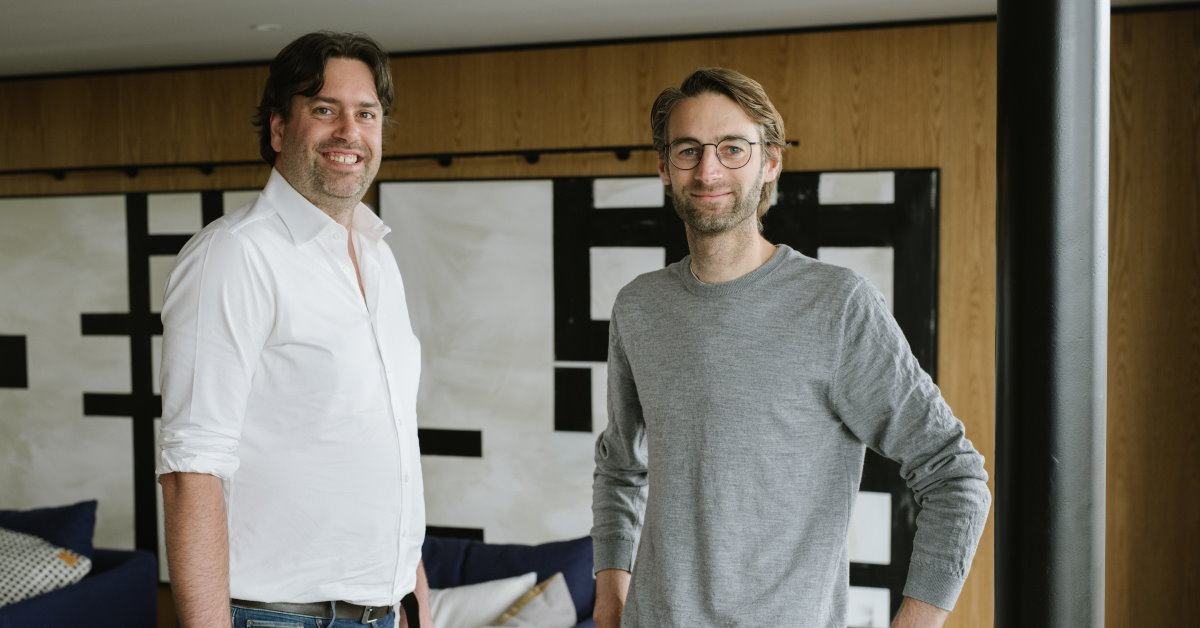Lepaya founders René Janssen (l) and Peter Kuperus (image: Techleap.nl)
As a leader of an Asian online retailer, René Janssen struggled to train thousands of employees. So he decided to quit his job, move back to Amsterdam and co-found a business to make that easier. Today, Lepaya is rapidly growing, expanding internationally and serving some of the fastest-growing and largest companies around, allowing them to properly train their employees.
Working hard on soft skills
The Amsterdam-based Lepaya is an online training platform to teach professionals all-important soft skills. Employees of organisations can work on their management styles, learn to focus, practice their decision-making or hone their team-building skills or any other of the numerous training on offer. Lepaya teaches these through, what they call, a ‘unique blended method’. It combines short classroom sessions with online learning via their app.
Get to know the amazing finalists here
Janssen’s journey started at Boston Consulting Group. On his very first day, he met with Peter Kuperus, who started his career there at the same time. They became friends and stayed in touch when their paths led somewhere else. Kuperus stayed in Amsterdam, occupying leading roles in Travelbird. Janssen moved to Asia to be a leader of pan-Asian online retailer Lazada.
Missing something
This is where Janssen felt there was no good way to train his thousands of employees with the skills that would help them further their careers. At Lazada, Janssen missed the company he was about to found.
Now Janssens and Kuperus’ product is in high demand, according to the wide range of fast-growing or already massive companies Lepaya can call its clients. Large international corporations like KPMG, ING, Microsoft and Philips use their service. But younger companies, like food delivery unicorn Just Eat-Takeaway, Dutch online grocer Picnic, online auction house Catawiki or ethical smartphone manufacturer Fairphone.
‘Good-looking names’
An impressive list by design, explains Lepaya CEO and co-founder René Janssen. “In the first couple of months, we really focused on bringing in some good-looking names as clients. We wanted the word to spread and it helped us to scale up later on,” he says of the logos of well-known companies he can put as a customer on his site. “If you can show logos that people love, then they’ll be more motivated to work for you as well.”
Even the very first customers were big fish. Lazada was one of them, as Lepaya’s offering was basically conceived with their organisation in mind. Bol.com, one of the largest online retailers in the Netherlands, also instantly jumped aboard. This was right after Janssen and Kuperus locked themselves in a room for a Google Design Sprint: the five-day process to design and validate a product. “We did it in four days”, likes to emphasise.
Four days of creating Lepaya
“On Monday, we worked on an MVP. That same afternoon we started reaching out to HR managers at large companies to get a feel of what they needed. On Tuesday we sketched out the feedback we had gotten. For Wednesday we hired a designer for mockups. And on Thursday we got back to those same HR managers to ask them to have a look at what we made.”
The reaction they got? “Overwhelmingly positive”, according to Janssen. “Everybody said ‘we want what you are making’. For a moment we even thought they were just overly polite. But in the end, it is also the product I would’ve wanted to have back at Lazada.”
Eight months to success
“So I called my bosses at Lazada and told them I was leaving.” A big step, as it meant leaving Asia and moving back to the Netherlands. “We said from the start that we wanted some criteria for success. We gave ourselves eight months to have a certain amount of customers and revenue, or we’d stop. It was a conscious choice. We didn’t want to let it drag on and keep on adding another month every time.”
Another important benchmark for Janssen and Kuperus’ company was fun. Janssen: “We want to be entrepreneurial and professional, but have some fun at the same time.”
To measure that particular benchmark, Janssen reached back to his days in the consultancy, where the ‘airplane test’ is conducted. “Imagine you’re about to take a flight with someone. Sitting next to this person for hours on end in a plane, a taxi afterwards.” If that is something to look forward to, that person passed the test. Janssen wanted Lepaya-people to pass.
Lepaya’s first day
Before having people passing aeroplane tests, there needed to be people in the first place. “We decided that if we wanted to start up Lepaya, we wanted to do it properly. On a large scale.” That meant an office on the Amsterdam canals from day one. “We also had interns starting on our very first day. They came to us asking what they should do. ‘Everything, I guess!’”
Janssen also landed on a name. The initial ‘Learning Experience Pathways’ sounded too corporate, he thought. “So we added Aya. It means ‘beautiful’ or ‘well-designed’ in both Japanese and Hebrew. We also wanted an available .com-domain. And having it sound like fun was also important. We weren’t going to settle for blah-blah-training.com or something dull.” Their name also proved to be fertile ground for fruity inside-jokes. “Our first developers used papayas in all our test products. Sometimes we still encounter papaya in some legacy code.”
Funding, expansion, acquisition
From then on, things moved fast for Lepaya. They conquered the Dutch and Belgian market and raised seed funding with Amsterdam-based Tablomonto. Last year, they added another €5 million Series A funding from Belgian Mediahuis, acquired hard-skill expert Smartenup and expanded to the German and Swedish market.
“We thought Sweden would be an easy market for us”, says Janssen. “It seemed much like the Netherlands, with the decision power being very low in the organisation.” That does come with its challenges when selling your SaaS-product, Janssen found. “In Germany, you have to work hard to convince one very senior executive. In Sweden, there’s always a group making the decision. People operate based on consensus.”
Next stop: UK
The next logical step for Lepaya would be to expand to the UK. The scaleup is busy with reconnaissance, according to Janssen. “There’s a lot of talent available there and our product is ready for the language.” After the UK, Asia is on the roadmap. “We believe we can make an impact with acquisitions. We hope to announce something shortly.”
Rapid growth, expansion, funding. In the weird year of 2020, none of that was obvious. COVID nearly threw a wrench in Lepaya’s oiled machine. “When the pandemic hit, we were just before closing our funding round”, remembers Janssen. “Sales slumped, investors were hesitant. It gave us some sleepless nights.”
‘We didn’t lose any revenue’
“Within the first days of the lockdown, we determined how we could address our customers’ problems. Within a week we decided to change our offering. Our classes went online free of cost. We weren’t cancelling anything.” That also meant many classes had to be re-written for an online environment. Lots of work, but it did get them lots of credits from their customers. “We offered solutions, we didn’t lose any revenue. That’s also what we were able to show to investors. That helped.”
Solutions at Rise
Scaling up rapidly as Lepaya does, requires reflection. That’s what Janssen recently got out of joining the Rise programme, organised by Techleap.nl. “It’s good to take time and ponder some key aspects of your business. Ask yourself how to scale, how to approach international go-to-markets. Take a step back and think things over.”
He also got the opportunity to share experiences and challenges with companies in similar growth stages, like Brenger, Fixico or Kaizo. Janssen: “You’re connecting with companies that are already doing really well. And Techleap.nl also brings in some big names, people that made it. The solutions they offered are very real.”
World is ready for Lepaya
An example: Janssen realised they are always serving two customers at the same time. “We learned that even though the end-users are the ones with our product in hands, the HR manager is paying the bills. They decide whether or not we’re scaling. That’s who we should focus on.”
“The market has changed”, says Janssen. “The pandemic has accelerated what we have been doing for a while. Our customers now see that too. Eventually, we’ll return to the more physical way of teaching, but it will remain more online than before. Now we can offer the best value and have the most impact. In a way, COVID has prepared the world for Lepaya.”
How partnering up with Salesforce helped him succeed!










